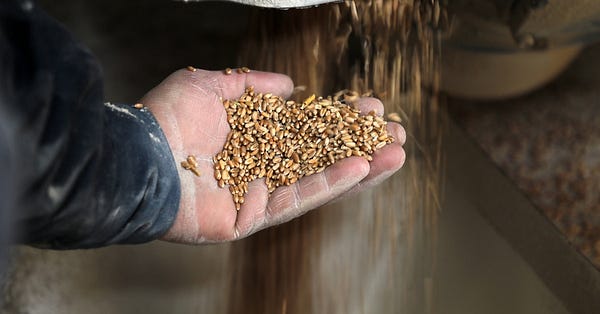Ukraine conflict squeezes resource supplies, Big Tech courts policy communicators and Dubai Expo ends with rave reviews
March 2022
Hello and welcome! 👋
The end of March means Q1 2022 is done and dusted. Despite the feeling of optimism during the Year of the Tiger celebrations, the general consensus is that this quarter was volatile, difficult and gloomy. Fingers crossed Q2 will herald good luck and good fortune.
WORRYING SUPPLY SQUEEZE
The humanitarian, financial and political costs of Russia’s war with Ukraine are startling - and the damage will certainly spread further as peace talks continue to stumble.
Although the size of Russia’s economy falls outside the top 10 list (it takes 11th place), and Ukraine doesn’t even feature in the top 25, these rankings can be very deceiving. When it comes to commodities, both countries are heavyweights and hold leverage over crucial supply chains.
While Russia’s status as an energy powerhouse was well established, many were unaware - until recently - of the country’s vast array of natural resources and agricultural products, ranging from oats to palladium. Ukraine is also a major player in the sunflower oil, corn and iron ore markets, to name a few.
As a result of the conflict, international trade and commodity stockpiles are being severely impacted. Here’s a snapshot of some key developments:
Wheat: Collectively, Russia and Ukraine are the bread basket of Europe. The two countries provide 30% of global wheat exports, and that figure is much higher for Egypt, Algeria, Turkey and Indonesia. Grain prices have skyrocketed since the invasion began, with concerns mounting about shipment delays and whether farmers will be able to sow their fields. Several thinktanks are now warning of a looming food crisis.
Nickel: A significant proportion of nickel - an essential material in rechargeable batteries and stainless steel - hails from Russia. So when fighting escalated in early March, the price of nickel went on the rampage. The 250% spike (in just 24 hours) forced the London Metals Exchange to shut down for a week.
Neon: Shortages of semiconductors could worsen if the conflict drags on, adding to the strain already felt by electronics and car manufacturers. Why? Ukraine is the world’s main producer of neon gas, which is used to power the laser-etching machines that turn slabs of silicon into microchips.
This upheaval is prompting economists to cut growth forecasts for 2022 as the prospect of a post-pandemic recovery dwindles.
TECH’S COMMS TASK FORCE
Meta and Alphabet’s expansion of their virtual realms requires real-life physical labour. The parent companies of Facebook and Google, respectively, are hiring across the board but one category of desired employee stands out: policy communications specialist.
As the tech titans get bigger and bolder, their CEOs have locked horns with lawmakers in Washington, London and Brussels over regulations. Consider the EU’s Digital Markets Act - the proposed legislation would give European watchdogs the authority to investigate “unfair business practices” and antitrust behaviour. For example, Apple could be ordered to open up its App Store to alternative payment systems.
In light of the enhanced scrutiny, the Silicon Valley giants are looking to bolster their teams of marketing & communications professionals in various regions.
Case in point: Meta is seeking a policy communications manager to cover the Middle East and North Africa. According to the job description, candidates must understand “the social debate around our platforms” to better explain “our position on…privacy, safety and security, freedom of expression, the impact of the Internet on economic growth, cybersecurity, taxation and new opportunities for democratic engagement.”
Members of these comms divisions are required to proactively speak to government stakeholders and the press, as well as brief internal spokespeople and prepare draft statements. Essentially, be an ‘influencer’ in the traditional sense of the word.
EXPLORING THE WORLD IN ONE CITY
Like the Tokyo Olympics and UEFA European Championship, the start of Dubai Expo was postponed to 2021 (but with original 2020 branding intact). It finally opened to the public on 1 October and ends today, 31 March.
World Expos have been happening at fairly regular intervals since the 19th century. The first one, called the Great Exhibition, was held in London in 1851. The goal was to support “a global gathering of nations dedicated to finding solutions to pressing challenges of our time”. At each edition, countries design unique pavilions and offer immersive educational activities.
Yet the fanfare around these fairs had died down in previous decades. Do you remember the hype for Expo 1992 Seville or Expo 2010 Shanghai? Probably not because they weren’t marketed as must-see extravaganzas.
Enter Dubai. In true Emirati fashion, the city-state built a grand, audacious and futuristic venue to unite more than 190 countries under the theme ‘Connecting Minds, Creating the Future’. The 483-hectare site also had space for outdoor performances, children’s play areas, restaurants and shops.
Everyone I met in Dubai this month shared enthusiastic recommendations on which pavilions were worth the long queues. Unfortunately Japan and Germany were too popular for their own good, but the other favourites I got to explore - Saudi Arabia, USA, Thailand and Singapore - were impressive and inspiring. So bring on Expo 2025 in Osaka!
Thanks for reading! Take care and stay curious, Sara x






